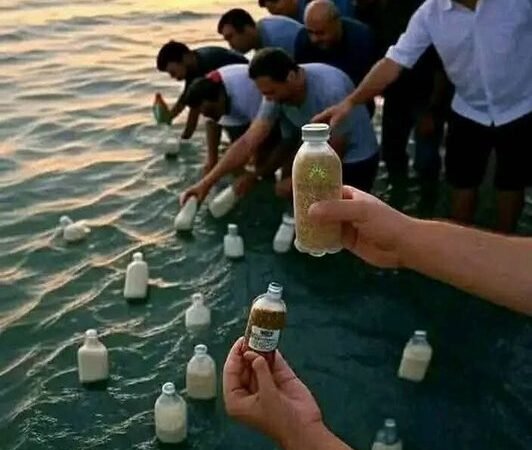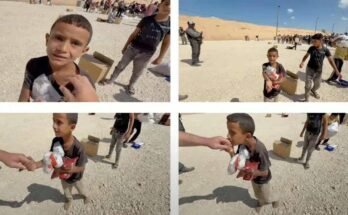In a world becoming increasingly desensitized to the suffering of war-torn lands, one simple yet poignant movement has got everyone talking Egyptians are filling bottles with food from the Mediterranean Sea, hoping to somehow make it onto the blockaded Gaza beaches. Titled “From Sea to Sea A Bottle of Hope for Gaza,” this grassroots campaign is more than a gesture. It is a symbol of kindness, rebellion, and hope against hope amidst an unrolling humanitarian catastrophe.
It was initiated with a spark of imagination and empathy on the part of an Egyptian academic, who proposed the initiative on social media. The concept was simple: pack empty plastic bottles with dry staples such as rice, lentils, flour, or sugar, seal them tightly, and send them floating out from Egypt’s North Coast. The sea, expansive and unpredictable, was the courier across two countries separated by borders and blockades.
Then, there ensued a wave of solidarity. Photos and videos were shared online of Egyptians families, youth groups, and activists gathering at the Mediterranean shore, gently pushing out their improvised relief packages into the sea. There was scribbled on each bottle words of love and solidarity: “From Egypt to Gaza,” “You are not alone,” “Stay strong.”
The Gaza Strip has remained under close Israeli siege since 2007, with Egypt controlling much of the southern edge. The siege, which Israel has justified as a security measure against Hamas, has imposed severe restrictions on the movement of people and other essential material. The blockade has, in the long run, converted Gaza into what the majority of human rights agencies have described as an “open-air prison,” where over two million Palestinians live in extreme economic hardship.
The humanitarian crisis has worsened even more in the last few years due to repeated wars, ravaged infrastructure, and a collapsed health system. Access to clean water, electricity, food, and medicine remains severely limited, as reported by the United Nations and relief organizations. The recent escalations of violence have also continued Gaza’s already strained humanitarian situation, leaving thousands of families homeless and crying out for aid.
The action of sending food by boat may not radically change Gaza’s material circumstances, but its symbolism is revealing. It symbolizes a people-to-people connection in defiance of politics that reminds us of shared Arab solidarity and long centuries of support for the Palestinian people.
In a region where official policy is often hindered by security and diplomatic considerations, this kind of civilian mobilization expresses the moral and intuitive urgency felt by common people. It is an unarmed, creative act of defiance against the dehumanizing and normalization of extended suffering.
Even when but a handful of bottles reach the shores of Gaza abetted by waves and luck the word has already reached noisily loud: Gaza is not forgotten.
The campaign has quickly gained momentum on the likes of Twitter, Facebook, TikTok, and Instagram with hashtags #FromSeaToSea, #BottleOfHope, and #SolidarityWithGaza trending throughout the Arab world. The campaign has been praised by sympathizers for its emotional impact, while others have called for more practical channels for providing direct humanitarian aid.
Other critics have criticized that the effort is naively or unrealistically hoping for the bottles to find their way to Gaza or as risking contamination. To counter this, organizers have emphasized that the bottles are biodegradable or recycled plastic and that the project is not replacing institutional aid, but to stimulate compassion and awareness.
This effort also indirectly accuses the international community of not being able to develop a means to control their misery in Gaza. As humanitarian aid convoys are halted or barred, and diplomatic talks languish, regular people appear to discover their own inventive means of expressing support for their cause.
The ocean, indifferent but strong, has become a vessel for compassion. It holds more than sustenance it holds the voices of those who will not be silenced.
In a time when hope is the defining characteristic of the Palestinian experience in Gaza, the “Bottle of Hope” initiative is a testament to the fact that hope is a form of resistance. Every bottle released into the sea is a message of the enduring strength of solidarity, of faith that even the slightest gestures of kindness can go far body and mind.
While the world argues and negotiates, the sea is listening. And sometimes that is all someone needs: to be aware that someone, somewhere, is thinking about them.
A Bottle of Hope for Gaza: Egyptians Turn to the Sea in a Symbolic Act of Solidarity



